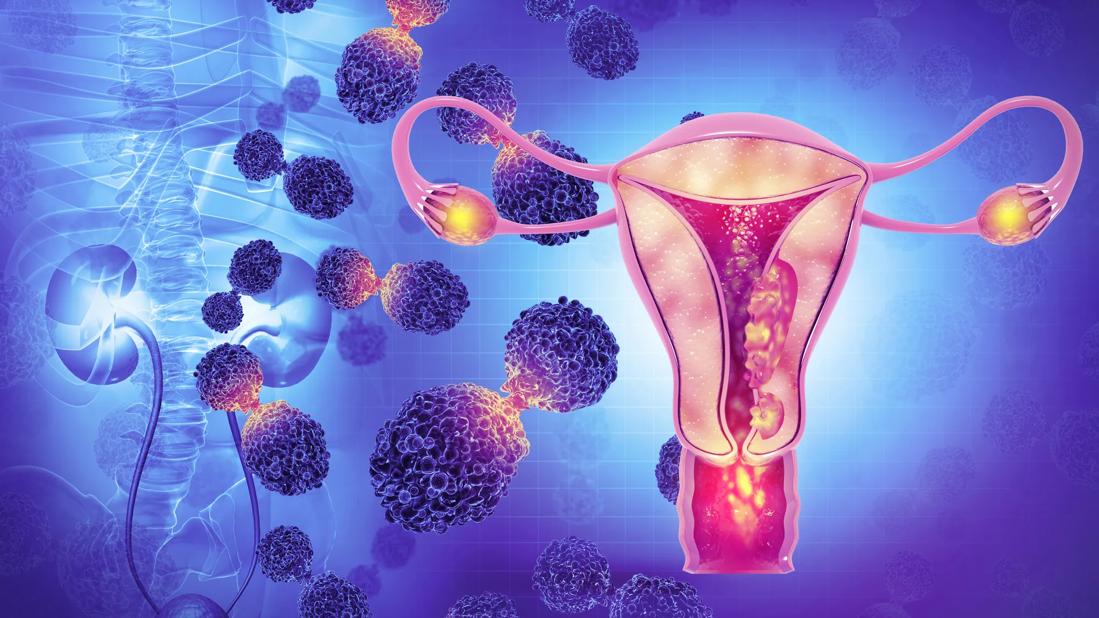Results point to lymphovascular space invasion as marker for poorer prognosis

Image content: This image is available to view online.
View image online (https://assets.clevelandclinic.org/transform/04f184d7-5ade-4616-91b0-33916f3dc0d2/uterus-cancer-1414626057)
Uterus
Leiomyosarcoma (LMS) in the uterus is rare, and even when diagnosed early, carries with it a dismal prognosis. Surgery is the mainstay for disease confined to the uterus, but controversy exists about whether to use adjuvant therapy. New research by Cleveland Clinic researchers suggests that observation may be a better option, despite recommendations to the contrary from the National Comprehensive Cancer Center (NCCN) for stage I LMS.
Advertisement
Cleveland Clinic is a non-profit academic medical center. Advertising on our site helps support our mission. We do not endorse non-Cleveland Clinic products or services. Policy
Published in The Journal of Gynecologic Oncology, the findings are from the largest outcomes-based study to date of adjuvant therapy in women with early-stage LMS. It is also the first study to show that lymphovascular space invasion (LVSI) is associated with poorer prognosis in women with LMS.
“Our data show that in women with early-stage LMS, there is no role for adjuvant therapy,” says Stephanie Ricci, MD, Assistant Professor of Ob/Gyn and Reproductive Medicine. “It doesn’t improve survival.”
The observational cohort included 1030 women with early-stage LMS from the 2008-2014 National Cancer Database (NCDB), 90% of whom had stage 1 disease. Of them, 53.1% were observed, 33.0% received chemotherapy, 7.7% received radiation, and 6.2% were treated with chemoradiation.
The primary goal of the study was to assess survival impact based on treatment group.
“Using the NCDB gave us access to many more cases than would be found at a single center,” says Dr. Ricci. “The one limitation of the database is that it does not include specifics about the type of chemotherapy or radiation therapy the patients received.”
The researchers also analyzed associations between exposure to adjuvant treatment and various sociodemographic and prognostic factors, and the effect of that therapy on mortality. Multi-nominal logistic regression was used to identify trends in receipt of adjuvant therapy and Kaplan-Meier curves were used to estimate survival.
Observation was more likely in patients with tumors < 5 cm (hazard ratio [HR] = 0.97; 95% confidence interval [CI] = 0.95-0.99; P = 0.017) and less likely in those with LVSI (HR = 0.60; 95% CI = 0.41-0.89; P = 0.10). Younger patients were more likely to receive chemotherapy (HR = 0.78; 95% CI = 0.65-0.94; P = 0.010), as were those with LVSI (HR = 1.47; 95% CI = 1.01-2.16; P = 0.040).
Advertisement
Older age, tumor size > 5 cm, and LVSI all were associated with worse survival, with LVSI being the strongest predictor of mortality (HR = 1.738; 95% CI 1.176-2.569; P = 0.006).
With median survival of 61.9 months, no difference was seen in estimated overall survival at 1 and 3 years in patients who received adjuvant treatment versus observation (P = 0.500). That held true after adjustment for a variety of factors, including race, lymph node evaluation, and performance of bilateral salpingo-oophorectomy.
The outcome did not come as a surprise to the authors, who reported similar outcomes in previous research. Says Dr. Ricci, “In a multi-institution study, we looked at the same question and found no difference in survival outcomes based on treatment arm. There was a trend toward better survival in women who had received chemotherapy, but it did not reach statistical significance.”
The NCCN guidelines for management of uterine sarcomas continue to list adjuvant chemotherapy as an option for patients with stage I LMS. The new findings add to a growing body of literature that runs contrary to that thinking. None of the data, however, are from a prospective trial, which is the gold standard for medical evidence, and for good reason. “Because LMS is so rare, it is very difficult to do a national prospective trial to prove our hypothesis,” says Dr. Ricci.
What is known is that the rate of recurrence in patients with early-stage LMS who have undergone hysterectomy is very high, regardless of whether they receive further treatment. And that makes counseling them to “watch and wait” particularly difficult.
Advertisement
“I tell my patients that I hope their cancer never comes back, and that we can reserve treatment until then,” says Dr. Ricci. “I emphasize that chemotherapy can be toxic, and that if they take it now, they might develop resistance, making the treatment less effective if the LMS does recur.”
Advertisement
Advertisement
Combination therapy improves outcomes, but lobular patients still do worse overall than ductal counterparts
Bringing empathy and evidence-based practice to addiction medicine
Supplemental screening for dense breasts
Combining advanced imaging with targeted therapy in prostate cancer and neuroendocrine tumors
Early results show strong clinical benefit rates
The shifting role of cell therapy and steroids in the relapsed/refractory setting
Radiation therapy helped shrink hand nodules and improve functionality
Standard of care is linked to better outcomes, but disease recurrence and other risk factors often drive alternative approaches